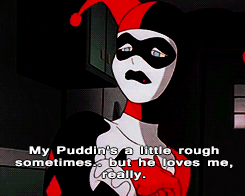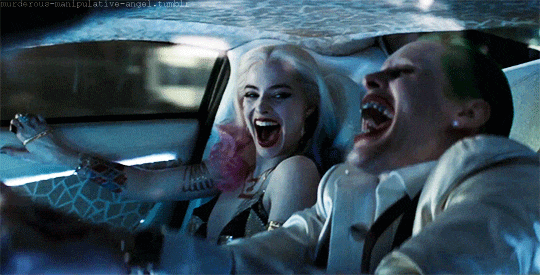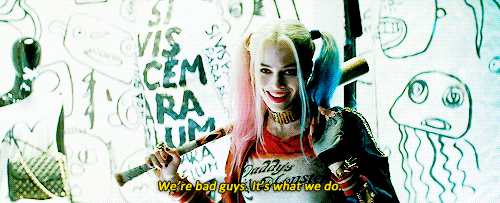When "Suicide Squad" was announced, the internet's first question was how the relationship between the Joker and Harley Quinn would be portrayed. The Joker is one of the most well-known villains in western fiction, and Harley Quinn has dramatically increased in popularity since her introduction in "Batman: The Animated Series" in 1992. While the relationship is complex and intriguing, it is also abusive, and the Joker often mentally and physically abuses the lovesick Harley. According to Paul Dini, Harley's' creator, Harley's story is not a victim's tale, but it is "a cautionary one about what happens when someone loves recklessly, obsessively, and for too long."
In the end, scenes featuring the abuse were cut, and instead "Suicide Squad" viewers got an entirely new angle of the relationship, a Joker that was not indifferent to Harley's affections, and was in love with her as well. This new arc is as unsettling as it is compelling.
While still not "relationship goals," this version does something previous installments have not; it presents them as equals. Harley Quinn is not the Joker's sidekick, they are two alphas, wreaking havoc while together and apart. They are two crazy people in love, and when they are separated, the Joker becomes more unhinged, desperate to reunite with her.
This new portrayal helps remind people that these two characters are villains. As said in Jayme Karales' article, "In the eyes of feminist DC fans, Harley Quinn is a villain—but she’s also a victim who is trying to better herself. And apparently that victimhood and the desire for some sort of betterment trumps having partaken in murders and ruining the lives of many." Harley Quinn is a character who loves being bad, which is a fact that some people seem to forget. This, as well as her nature to make flawed choices, are things that humanize her. The article goes on to explain, "Like Harvey Dent, Quinn is a character who occasionally undergoes brief periods of clarity where she wants to escape her own toxic behavior and surroundings—but ultimately caves to a criminal and often macabre lifestyle, as that is what comes natural."
I consider myself to be a feminist, but I also feel that nowadays people focus too much on painting Harley as a victim than focusing on the other qualities that made her so popular. Since their inception, these two characters have been purposely written to be likable and fascinating, despite their villainous ways. You are supposed to be drawn to them and their relationship.
Margot Robbie, who plays Harley Quinn in the film, has been open about how dysfunctional the relationship is and that the Joker is a weakness for her character, but she also said "Honestly, I find their stuff the most exciting out of everything. I’d watch a dialogue scene between them over, like, buildings blowing up and guns, which I love that stuff as well. But when they are just—or when they find someone that they wanna pick on, it’s scary.”
There are a lot of problems with "Suicide Squad," but one of the things it did well was showing a new interpretation of the relationship, and it is a shame that it was only a subplot of the movie. Many of the movie's best scenes involve the Joker and Harley, because despite its dysfunctional nature, there is a level of magnetism we see in their relationship.
"Suicide Squad" is not "Twilight," meaning the Joker's abusive tendencies are not painted as romantic, there are still hints of the creepiness and abuse layered within their scenes in the movie. However, the new spin on the Joker's character not only gives viewers an exciting interpretation of a beloved villain, it also gives Harley a lot of her agency back and allows her to be seen as an independent. It was obvious that her choice to become Harley Quinn and join him was entirely her decision, and that she embraces her desire to be bad.
Making the relationship more loving while keeping remnants of previous versions gives promise of a new Joker that the world has never seen before, and it also allows the audience to see all of Harley Quinn's complexities, instead of just as a victim of abuse. With this new portrayal, there is no black and white; the Joker is not just an abuser and Harley is not just a victim. Their relationship, and the characters themselves, are gray.
























